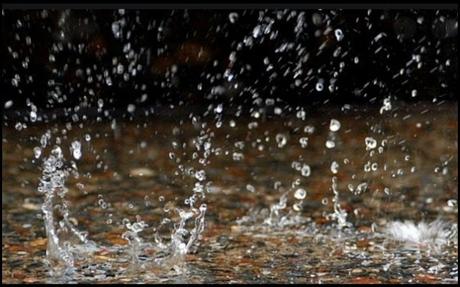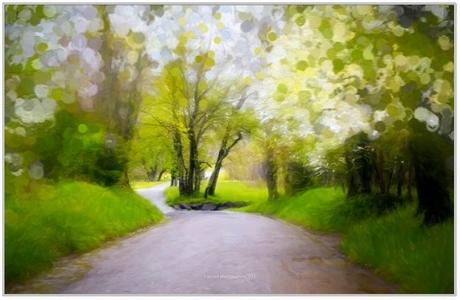It's probable you'd never come across the word before, but petrichor is the name given to that delicate, delicious smell which fills the air as rain showers onto earth. I use earth quite loosely here to encompass dust, rock, soil and stone. It was only coined about fifty years ago by a pair of Australian researchers who, in the best scientific tradition, reached back to the Greek and compounded the words for stone (petros or πέτρος) with (ichor or ἰχώρ) - effectively the lifeblood of the gods - to make petrichor, a noun perhaps as elusive of literal definition as the essence it describes.
The science - and we all follow the science these days, don't we? - explains that many plants contain an oil which they exude during dry spells. This oil is absorbed by soil and rocks. When rain arrives, an earthy odour fills the air because the water droplets acting on the porous dust, rock (including concrete), soil and stone release some of that oil into the atmosphere along with another substance, geosmin, itself a by-product of bacteria in the earth. Our nostrils are able to detect geosmin in tiny amounts - 5 parts per trillion - and so we breathe in the 'scent of rain'. Aaaah, petrichor, we exclaim contentedly. A synthesized version of the aroma is now available.

First posited as a fictional brand in an episode of Doctor Who, Petrichor, 'that very special earthy scent created when rain falls on dry soil' is now being marketed by the American fragrance company Demeter as a cologne spray, a roll-on oil, a body lotion, a shower gel and a diffuser. I leave it up to you to decide if you're worth it.
All of this talk about earthy scents and sensitive noses leads me to recommend a novel to you, something I haven't done for a while, but I read it recently and thought it quite extraordinarily good. The book is question is Perfume by the German author Patrick Suskind. Sub-titled 'The story of a murderer', and described as a bewitching, darkly humorous fable of desire, obsession and death, Perfume was written in the 1980s but its story unfolds two centuries earlier in France.
It's all about one Jean-Baptiste Grenouille, abandoned as a baby in a Paris slum, but possessed of an extraordinary gift - a sense of smell more powerful than any other human being's. He can read the world via his nose and his prodigious gift leads him to create the most sublime perfumes in 18th century France. His obsession with scent also lures him down the path of serial-killing - but I don't want to give more away.
The tale is an absorbing one, the writing is a tour de force, especially when Suskind dwells on the olfactory and the fascinating details about how perfumes are made. The descriptive language is fabulous. No wonder the novel has become something of an international cult read. It has been made into a film as well apparently, but I can't imagine a movie will be able to match the imaginative power of the writing. Anyway, that's my recommendation for this summer's staycation reading.
As for petrichor itself, I thought I'd add to the poems on theme this week with an excursion of my own into the fleeting realm of scent.

That Geosmin Moment
Into our stifling hothouse, a hint of change.
Temperature and pressure drop perceptibly
as sky shades yellow, thick with electricity.
This enervation which has heavied limbs
for countless dusty days is surely set to end
when heaven rends and showers all beneath.
Some find most favour with the moment
lightning strikes, breaking the tension; but I
savour the first patterings of pregnant rain
on desiccated earth. This simple-seeming act
unlocks rich chemistry; attar of parched soil
and plant oil minutely macerated, waft me
your ancestral perfume of regeneration even
as the longed-for deluge arrives, obliterating
heat, dust and lethargy in cool, fresh green.
As ever, thanks for reading. Keep sniffing - safely, S ;-) Email ThisBlogThis!Share to TwitterShare to Facebook
Reactions:
